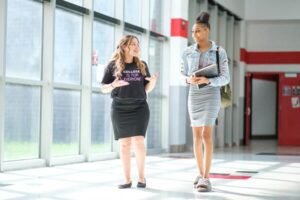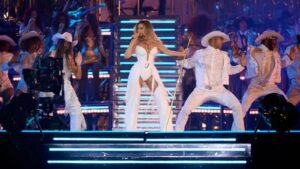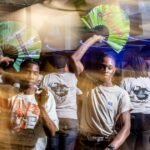Texas State Helps Students Bounce Back From 2.0 GPA
As more colleges and universities consider initiatives, processes and policies to create a more student-focused campus, they are zeroing in on two areas of concern: academic probation and academic recovery.
A growing body of research highlights the way negative life experiences and competing priorities impact students’ academic achievement, sometimes exerting a stronger influence than prior academic preparation.
Texas State University has established a new initiative, Bobcats Bounce Back, to help students whose grades have fallen below a 2.0 learn self-efficacy, resiliency and strong study skills.
The background: The university has a goal of increasing its first-year retention rate from 77 percent in 2012 to 85 percent by 2025, said Cynthia Hernandez, vice president for student success. Early on, officials recognized that the institution lacked a strong academic recovery program, so Hernandez and her team prioritized devising a proactive solution to reduce the number of students who fell into poor academic standing.
Since 2009, the university’s policy has been that students who fall below a 2.0 cumulative GPA must meet with an academic adviser at least once a semester. The intervention has proven mostly successful, in that some students have moved back into good academic standing—though not everyone has, said Jason O’Brien, assistant director for academic engagement at Texas State.
An analysis of institutional data revealed that students who improved their academic trajectory used support services at least once a month, or four times per term.
“If students are [showing up], I know they’ve got the time and they’ve got a goal, they know what they’re working on,” O’Brien said. The challenge is getting each student to be proactive and engage early, not wait until the end of the semester, before finals.
Using institutional data, Texas State leaders revamped academic probation requirements to encourage students to make at least four connections with support services each semester; those who don’t, receive personalized outreach.
How it works: In the Bobcats Bounce Back program, students with a 2.0 GPA or lower are asked to participate in at least four support services, which could include success coaching, tutoring or a student success webinar. Students must meet with an academic adviser for at least one of their mandatory check-ins and they receive weekly communication from the office of academic engagement to encourage them to meet their goals.
A few weeks into the term, O’Brien’s team runs a report that identifies students on academic probation who have yet to engage with a support office. Students who live off-campus receive communication from the academic engagement team and those in the residence halls receive outreach from their residence life director.
“We’re not asking, ‘How are your classes going?’” O’Brien said. “We’re saying, ‘How are you doing? What’s going on in [your] life right now? Do you feel safe? Are you able to eat? Do you have any needs that aren’t met? Is your family OK?’ We’re trying to make sure that all of those basic needs, all that it takes to be a successful human is on track, and then from there we move on to, ‘OK, talk to me about classes.’”
The aim is to be human-centered and conversational in order to learn from the student and bridge any gaps in services and resources the university can provide to promote student success.
Sometimes this means helping students understand ways to correct their academic transcript, such as repeating a course or asking for an administrative withdrawal when relevant.
“We make a lot of asset-based assumptions,” O’Brien said. “My assumption is that no student is choosing to fail a course; they are choosing to be successful in something else out of necessity,’” which could include prioritizing their health, caring for a family member or working extra hours to make ends meet. “What we want to do is find out about those early enough to prevent it from impacting a transcript.”
The impact: During the inaugural program term in fall 2024, Bobcats Bounce Back supported 1,706 undergraduates; this term it is assisting 2,579 students. (Most academic recovery programs see higher rates of participation in the spring term because first-year students are most likely to face academic challenges in their first term, which can dramatically impact their GPA, O’Brien said).
Year-over-year, 270 percent more students who were not in good academic standing engaged in academic supports in fall 2024, for an average of 3.11 engagements per students. The university also saw a 3 percent increase in the number of students who regained good academic standing from fall 2023 to fall 2024, and a 7 percent decrease in academic suspensions.
At the 12-week mark in spring 2025, average engagements among students on academic probation were up 74.8 percent, from 1.31 to 2.29.
The data illustrates the program’s success so far, and O’Brien believes it’s due in part to their responsiveness to student needs. As the program has grown, more students are willing to seek out the office and engage. “They’re starting to have faith in us and ask for the support they need,” O’Brien said.
Program participants also have an opportunity to submit a guided reflection, called a B3 Field Note, every four weeks to build their socioemotional skills. Each prompt is rooted in research-backed strategies to improve academic self-efficacy and engagement. O’Brien has been amazed at the thoughtful responses he’s seen thus far and plans to conduct a critical discourse analysis project to identify students who may need additional support based on their field note submissions.
In the future, college leaders hope to target additional students who may be at-risk, but haven’t quite fallen below the 2.0 cumulative GPA threshold, a group Hernandez called the “murky middle.”
If your student success program has a unique feature or twist, we’d like to know about it. Click here to submit.
You may be interested

Here Comes The Sun: A dynamic director and the legacy of Lucy
new admin - May 02, 2025Here Comes The Sun: A dynamic director and the legacy of Lucy - CBS News Watch CBS News It takes…

NCAA: football coaches punished for $100K betting scandal
new admin - May 02, 2025[ad_1] NEWYou can now listen to Fox News articles! Five current or former Iowa State football coaching staff members have…

Beyoncé Sings ‘Single Ladies,’ ‘If I Were a Boy’ at Cowboy Carter Tour
new admin - May 02, 2025[ad_1] Beyoncé added more of her hits to the setlist on Night 2 of her Cowboy Carter tour. On Thursday…
































